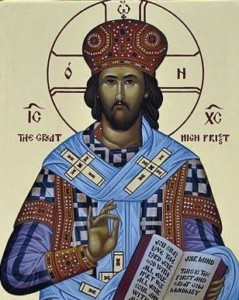Sunday of the Holy Cross Hebrews 4:14-16, 5:1-6

The themes arising in this Epistle reading are central to our Orthodox Christian faith. The first theme is that Christ truly became human and took on the fallen human nature: ‘…was in all points tempted like we are, yet without sin’ (4:15). Christ’s example shows the state to which humanity can ascend in spite of the temptations which are thrown at it, and lays the groundwork for the idea of theosis, which is further elaborated upon by Church Fathers such as St Athanasius and St Gregory Palamas.
The next theme is of Christ, the Great High Priest (4:14), as foreshadowed by Melchizedek (5:6). When Moses received the law from God on Mount Sinai, he also received many commandments for the performance of the role of High Priest, which can be found in the book of Leviticus. These laws in the Old Testament foreshadow and point the way towards Christ, whose performs the High Priest roles in His ministry. Christ instructed the people to approach God in a way the priests during His earthly ministry did not. He sacrificed Himself instead of the unblemished animals sacrificed in the Temple (5:3).
He showed mercy and compassion where the priests emphasised rigidity and adherence to the letter, not the spirit, of the law (5:2). The final theme explored here is the calling that a person receives. It was Christ’s calling to be High Priest in the same way that Aaron was called directly by God to that role (5:4-6). In this way, we are to be attentive to the voice of God which speaks through the conscience and through one’s spiritual father and instructs us how best to serve God in everyday life. This requires that God’s will be recognised and followed as it was in Christ’s case, when He said ‘not as I will, but as You will’ (Matthew 26:39).
Source: Lychnos February/March 2020
